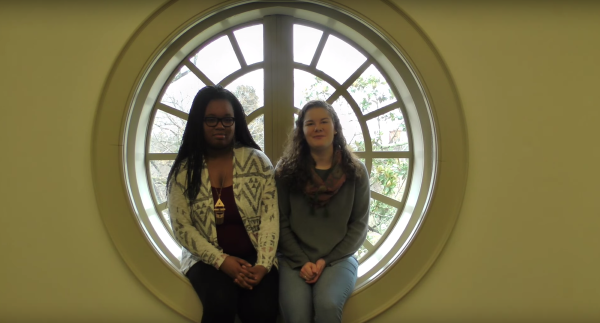Over the last few months, the College of William and Mary has been the subject of a high-profile conversation on mental health. Before classes ended last April, the Washington Post detailed reactions to the fourth on-campus student suicide during that academic year, and the lack of a full-time psychiatrist was one focus of a student sit-in held at the Sir Christopher Wren Building in the fall.
Now, student concerns about mental health are playing a large role in the Student Assembly elections for president and vice president. Each of the candidates’ platforms includes attention to mental health advocacy and awareness on campus.
According presidential contender Eboni Brown ’17 and vice presidential hopeful Hannah McKiernan ’17, their platform essentially aims to address the campus climate surrounding mental health. When the pair created their platform, they talked with groups on campus that had existing programming relating to mental health.
This is the campaign. We are running on advocacy for students. To see the amount of students who are saying that this is an issue is what we live for. We are fighting for students that have issues that aren’t being addressed. — Eboni Brown ’17
“This is the campaign,” Brown said. “We are running on advocacy for students. To see the amount of students who are saying that this is an issue is what we live for. We are fighting for students that have issues that aren’t being addressed.”

As part of their platform, Brown and McKiernan acknowledge the recent hiring of a full-time psychiatrist and plan to work with the Counseling Center to spread awareness of the Center’s services. They also plan to continue to support the SA’s Mental Health Week, as well as working with HOPE and other student organizations to promote mental health.
McKiernan posted her personal experiences with depression and a family history of mental health on the pair’s Facebook page Friday, March 18. According to McKiernan, her personal post has sparked more questions about their platform and positive feedback from other students.
“We included mental health in our platform not just because the campus is addressing mental health, but because it’s important to acknowledge the great strides we have made,” McKiernan said. “The big role that Eboni and I saw for mental health in our platform is being advocates for student assembly to the rest of campus. It helps when people are willing to share their stories and breakdown the stigma. It wasn’t easy for me to share that story, but if Eboni and I want to be advocates for the student body we have to put ourselves out there, we are not a separate entity. I understand what it is like to be a student with a mental illness on our campus and that’s part of our platform.”
Justin Canakis ’17 and A.J. Scalia ’17, another presidential ticket, place their focus on mental health as well. According to their campaign’s website, the pair plans to foster increased communication between the Counseling Center and the student body to erode the stigma associated with seeking help. They also plan to advocate for increased funding for social outlets and sports clubs to help them better cope with academic stress.
The pair plans on creating an SA website that will provide students an easy place to access all information related to the College. This website would also provide resources for students seeking psychological help.
“Why don’t we put some money into supporting mental health,” Canakis said. “I heard earlier in the year that we didn’t have a full-time psychiatrist. Why can’t SA put money into hiring another psychiatrist? We also have to erode the stigma associated with it. We have to create an open forum for discussion, like our website. We have to make the resources for students known.”
The third pair of contenders, Katherine Ambrose ’17 and Liz Jacob ’17, focus part of their expanded platform, “addressing the priorities,” on their mental health-related plans. According to their website, the duo wants to foster public communication and provide easier access to information about mental health resources. The website said that they hope to use SA publicity efforts to raise awareness for mental health and promote free campus opportunities like yoga rooms and meditation rooms.
Plans focusing on mental health programs include holding neurodiversity-focused initiatives, publicizing the Tribe Rides system and collaborating with the Counseling Center to strengthen their online tools, as well as using the SA website to promote the Center’s resources. Moreover, they want to facilitate a collaboration between academic departments and Student Accessibility Services for when students require extra attention.
“We thought well about how all students on campus intersect with mental health in some capacity,” Ambrose said in an email. “Throughout our experiences we have had the privilege of being resources for friends regarding mental health. We understand for the community to operate at its best our individual members need to have space and resources for their well-being. Because our community holds mental health in such high regard we made it a priority for our campaign to best advocate for our students.”


—It helps when people are willing to share their stories and breakdown the stigma.
It helps not at all when someone lends credence to a “stigma”. It is a primary way of hurting. Stop.